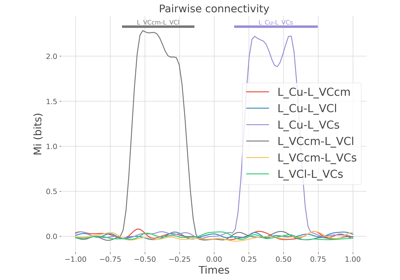frites.workflow.WfConnComod#
- class frites.workflow.WfConnComod(inference='rfx', estimator=None, kernel=None, verbose=None)[source]#
Workflow of instantaneous pairwise comodulations and statistics.
This class allows to define a workflow for computing the instantaneous pairwise connectivity using mutual information and then to evaluate the significance with non-parametric statistics (either within-subjects or between subjects). Note that the MI is computed at each time point and across trials.
- Parameters:
- inference{“ffx”, “rfx”}
Statistical inferences that is desired. Use either :
‘ffx’ : fixed-effect to make inferences only for the population that have been used
‘rfx’ : random-effect to generalize inferences to a random population.
By default, the workflow uses group level inference (‘rfx’)
- estimator
MIEstimator|python:None Estimator of mutual-information. If None, the Gaussian-Copula is used instead. Note that here, since the mutual information is computed between two time-series coming from two brain regions, the estimator should has a mi_type=’cc’
- kernelnumpy:array_like |
python:None Kernel for smoothing true and permuted MI. For example, use np.hanning(3) for a 3 time points smoothing or np.ones((3)) for a moving average
See also
conn_get_pairsconn_reshape_undirected
References
Friston et al., 1996, 1999 [8][9]
- Attributes:
Methods
clean()Clean computations.
fit(dataset[, mcp, n_perm, cluster_th, ...])Run the workflow on a dataset.
- fit(dataset, mcp='cluster', n_perm=1000, cluster_th=None, cluster_alpha=0.05, n_jobs=-1, random_state=None, **kw_stats)[source]#
Run the workflow on a dataset.
In order to run the worflow, you must first provide a dataset instance (see
frites.dataset.DatasetEphy)Warning
When performing statistics at the cluster-level, we only test the cluster size. This means that in your results, you can only discuss about the presence of a significant cluster without being precise about its spatio-temporal properties (see [17])
- Parameters:
- dataset
frites.dataset.DatasetEphy A dataset instance
- mcp{‘cluster’, ‘maxstat’, ‘fdr’, ‘bonferroni’, ‘nostat’,
python:None} Method to use for correcting p-values for the multiple comparison problem. Use either :
‘cluster’ : cluster-based statistics [default]
‘maxstat’ : test-wise maximum statistics correction
‘fdr’ : test-wise FDR correction
‘bonferroni’ : test-wise Bonferroni correction
‘noperm’ / None : no permutations are computed
- n_perm
python:int| 1000 Number of permutations to perform in order to estimate the random distribution of mi that can be obtained by chance
- cluster_th
python:str,python:float|python:None The threshold to use for forming clusters. Use either :
a float that is going to act as a threshold
None and the threshold is automatically going to be inferred using the distribution of permutations
‘tfce’ : for Threshold Free Cluster Enhancement
- cluster_alpha
python:float| 0.05 Control the percentile to use for forming the clusters. By default the 95th percentile of the permutations is used.
- n_jobs
python:int| -1 Number of jobs to use for parallel computing (use -1 to use all jobs)
- random_state
python:int|python:None Fix the random state of the machine (use it for reproducibility). If None, a random state is randomly assigned.
- kw_stats
python:dict| {} Additional arguments to pass to the selected statistical method selected using the stat_method input parameter
- dataset
- Returns:
- mi, pvaluesnumpy:array_like
DataArray of mean mutual information and p-values both of shapes (n_times, n_pairs)
References
Maris and Oostenveld, 2007 [13]
Examples using
fit:
- property mi#
List of length (n_roi) of true mutual information. Each element of this list has a shape of (n_subjects, n_times) if inference is ‘rfx’ (1, n_times) if inference is ‘ffx’.
- property mi_p#
List of length (n_roi) of permuted mutual information. Each element of this list has a shape of (n_perm, n_subjects, n_times) if inference is ‘rfx’ (n_perm, 1, n_times) if inference is ‘ffx’.
- property tvalues#
T-values array of shape (n_times, n_roi) when group level analysis is selected.
- property wf_stats#
Get the workflow of statistics.
